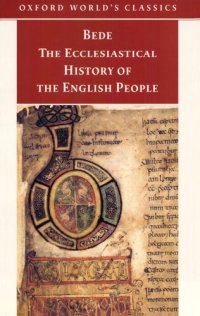
Ebook: The Ecclesiastical History of the English People; The Greater Chronicle; Bede's Letter to Egbert
Author: Bede Beda Venerabilis Bertram Colgrave (transl.) Judith McClure Roger Collins (eds. transl.)
- Genre: History
- Series: Oxford World's Classics
- Year: 1999
- Publisher: Oxford University Press
- Edition: Reprint
- Language: English
- pdf
Edited with an Introduction and Notes by Judith McClure and Roger Collins.
Bede was probably born in Bernicia, the northern component of the Kingdom of the Northumbrians, around the year 673. Nothing is known of his parents. At the age of 7 he entered the recently founded monastery of St. Peter at Wearmouth, and was ordained a priest c. 703. By about 710 he had begun writing a series of commentaries on various books of the Old and New Testaments, and he undertook his first hagiographical commissions in the same period. His work as historian began with his compilation of chronicle sections to form part of works that he wrote on the divisions of time. He completed writing his best-known book, 'The Ecclesiastical History of the English People', in 731. His last known work was the letter that he sent to Bishop Egbert of York in 734. He died on 25 May 735. After his death his fame in Britain was matched by the interest in him shown by the Anglo-Saxon missionaries on the Continent, for or by whom many of the surviving early manuscripts of his works were written. The Viking attacks on Northumbria in the ninth century cut short a growing cult of Bede, which was revived in a more limited way after the Norman Conquest.
'The Ecclesiastical History of the English People' (731 AD) is Bede's most famous work. As well as providing the authoritative Colgrave translation of the 'Ecclesiastical History', this edition includes a new translation of the 'Greater Chronicle', in which Bede examines the Roman Empire and contemporary Europe. His 'Letter to Egbert' gives his final reflections on the English Church just before his death, and all three texts here are further illuminated by a detailed introduction and explanatory notes.
Bede was probably born in Bernicia, the northern component of the Kingdom of the Northumbrians, around the year 673. Nothing is known of his parents. At the age of 7 he entered the recently founded monastery of St. Peter at Wearmouth, and was ordained a priest c. 703. By about 710 he had begun writing a series of commentaries on various books of the Old and New Testaments, and he undertook his first hagiographical commissions in the same period. His work as historian began with his compilation of chronicle sections to form part of works that he wrote on the divisions of time. He completed writing his best-known book, 'The Ecclesiastical History of the English People', in 731. His last known work was the letter that he sent to Bishop Egbert of York in 734. He died on 25 May 735. After his death his fame in Britain was matched by the interest in him shown by the Anglo-Saxon missionaries on the Continent, for or by whom many of the surviving early manuscripts of his works were written. The Viking attacks on Northumbria in the ninth century cut short a growing cult of Bede, which was revived in a more limited way after the Norman Conquest.
'The Ecclesiastical History of the English People' (731 AD) is Bede's most famous work. As well as providing the authoritative Colgrave translation of the 'Ecclesiastical History', this edition includes a new translation of the 'Greater Chronicle', in which Bede examines the Roman Empire and contemporary Europe. His 'Letter to Egbert' gives his final reflections on the English Church just before his death, and all three texts here are further illuminated by a detailed introduction and explanatory notes.
Download the book The Ecclesiastical History of the English People; The Greater Chronicle; Bede's Letter to Egbert for free or read online
Continue reading on any device:

Last viewed books
Related books
{related-news}
Comments (0)